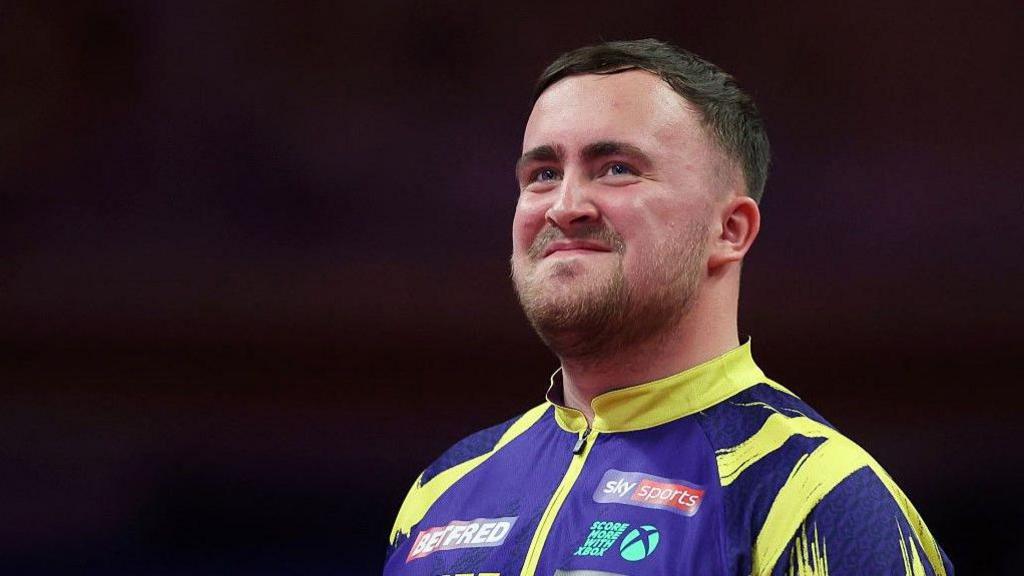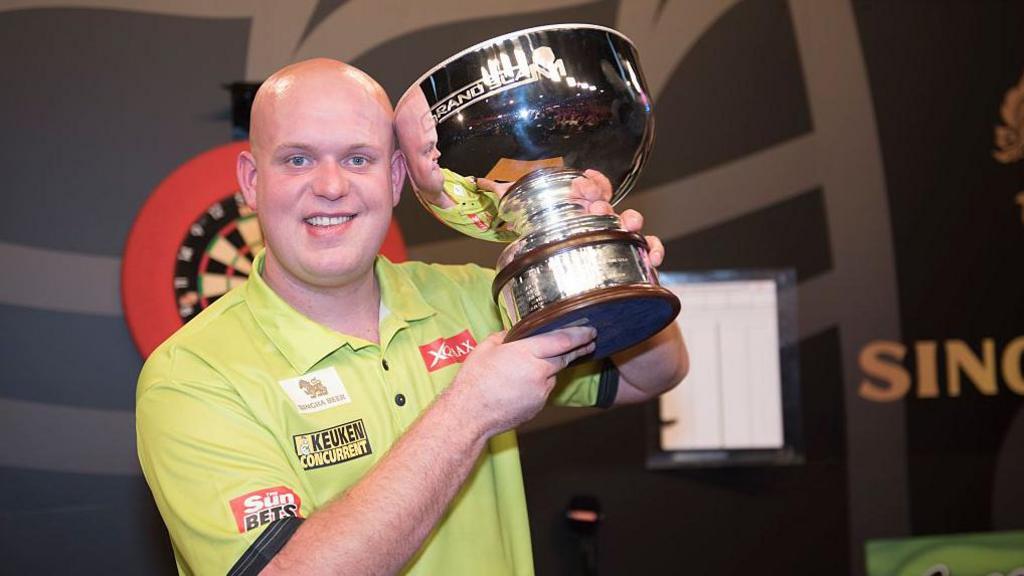Grand Slam of Darts: Format, results and prize money

- Published
The 2025 Grand Slam of Darts gets under way this week as one of the Professional Darts Corporation's (PDC) major tournaments roars into action in Wolverhampton.
Unlike most of darts' major tournaments, the 32 qualifiers are split into eight groups of four, rather than a straight knockout format.
Each player will face three opponents in their group, with the top two progressing into the last 16.
The rest of the competition is a straight knockout.
Luke Littler is the defending champion following a 16-3 demolition victory over Martin Lukeman in the 2024 final.
How do darts world rankings work?
- Published12 November
Get in touch
Send us your questions
When is the Grand Slam of Darts?

Luke Littler won the 2024 Grand Slam of Darts title
The tournament lasts for nine days from Saturday, 8 November to Sunday, 16 November.
Group stage (8 November to 11 November) – 48 matches
Second round (12 November to 13 November) – eight matches
Quarter-finals (14 November to 15 November) – four matches
Semi-finals (16 November) – two matches
Final (16 November) – one match
What is the format?
In the group stage, the format is a best of nine legs, or first to five legs.
For the latter stages of the competition, matches are significantly longer.
Second-round matches consist of a best-of-19-legs format, or first to 10 legs.
The quarter-finals, semi-finals and final are best of 31 legs, or first to 16 legs.
The first 10 players qualified for the tournament by reaching televised major finals in the past 12 months.
The other 22 players are made up of winners of events on the PDC, Championship Darts Corporation (for players in the United States and Canada), Women's Tour, European Tour and a PDC Tour qualifying event.
Players are then placed into four pots for the group-stage draw, with the top eight players in the PDC's Order of Merit seeded.
Schedule and results
Final
16 November
Luke Humphries 11-16 Luke Littler
Semi-finals
16 November
(1) Luke Humphries 16-13 Gerwyn Price
(2) Luke Littler 16-9 Danny Noppert
Quarter-finals
14 November
Ricky Evans 9-16 Gerwyn Price
(1) Luke Humphries 16-8 Michael Smith
15 November
Danny Noppert 16-8 Lukas Wenig
(2) Luke Littler 16-12 Josh Rock
Second round
12 November
Luke Woodhouse 9-10 Ricky Evans
Gerwyn Price 10-6 Martin Schindler
(1) Luke Humphries 10-3 Jurjen van der Velde
(8) Chris Dobey 9-10 Michael Smith
13 November
Lukas Wenig 10-8 Niko Springer
Josh Rock 10-9 Connor Scutt
(2) Luke Littler 10-4 Wessel Nijman
(3) Michael van Gerwen 6-10 Danny Noppert
First round
Group A
Final standings: 1. Luke Humphries, 2. Michael Smith, 3. Nathan Aspinall, 4. Alex Spellman
Saturday, 8 November
Nathan Aspinall 3-5 Michael Smith
Luke Humphries 5-0 Alex Spellman
Sunday, 9 November
Nathan Aspinall 5-2 Alex Spellman
Luke Humphries 5-3 Michael Smith
Monday, 10 November
Luke Humphries 5-3 Nathan Aspinall
Michael Smith 5-2 Alex Spellman
Group B
Final standings: 1. Chris Dobey, 2. Jurjen van der Velde, 3. Damon Heta, 4. Martin Lukeman
Saturday, 8 November
Damon Heta 5-1 Martin Lukeman
Chris Dobey 5-1 Jurjen van der Velde
Sunday, 9 November
Martin Lukeman 4-5 Jurjen van der Velde
Chris Dobey 5-1 Damon Heta
Monday, 10 November
Chris Dobey 5-1 Martin Lukeman
Damon Heta 3-5 Jurjen van der Velde
Group C
Final standings: 1. Luke Woodhouse, 2. Martin Schindler, 3. Alexis Toylo, 4. Stephen Bunting
Saturday, 8 November
Martin Schindler 2-5 Luke Woodhouse
Stephen Bunting 4-5 Alexis Toylo
Sunday, 9 November
Stephen Bunting 4-5 Martin Schindler
Luke Woodhouse 5-2 Alexis Toylo
Monday, 10 November
Martin Schindler 5-2 Alexis Toylo
Stephen Bunting 4-5 Luke Woodhouse
Group D
Final standings: 1. Gerwyn Price, 2. Ricky Evans, 3. James Wade, 4. Stefan Bellmont
Saturday, 8 November
Gerwyn Price 4-5 Ricky Evans
James Wade 4-5 Stefan Bellmont
Sunday, 9 November
James Wade 0-5 Gerwyn Price
Ricky Evans 5-4 Stefan Bellmont
Monday, 10 November
Gerwyn Price 5-1 Stefan Bellmont
James Wade 5-2 Ricky Evans
Group E
Final standings: 1. Luke Littler, 2. Connor Scutt, 3. Karel Sedlacek, 4. Daryl Gurney
Saturday, 8 November
Daryl Gurney 4-5 Connor Scutt
Luke Littler 5-1 Karel Sedlacek
Sunday, 9 November
Daryl Gurney 3-5 Karel Sedlacek
Luke Littler 5-3 Connor Scutt
Tuesday, 11 November
Connor Scutt 5-3 Karel Sedlacek
Luke Littler 5-1 Daryl Gurney
Group F
Final standings: 1. Josh Rock, 2. Wessel Nijman, 3. Gian van Veen, 4. Lisa Ashton
Saturday, 8 November
Josh Rock 4-5 Wessel Nijman
Gian van Veen 5-4 Lisa Ashton
Sunday, 9 November
Josh Rock 5-0 Lisa Ashton
Gian van Veen 5-3 Wessel Nijman
Tuesday, 11 November
Gian van Veen 2-5 Josh Rock
Wessel Nijman 5-0 Lisa Ashton
Group G
Final standings: 1. Michael van Gerwen, 2. Niko Springer, 3. Beau Greaves, 4. Gary Anderson
Saturday, 8 November
Gary Anderson 4-5 Niko Springer
Michael van Gerwen 5-4 Beau Greaves
Sunday, 9 November
Gary Anderson 5-4 Beau Greaves
Michael van Gerwen 4-5 Niko Springer
Tuesday, 11 November
Michael van Gerwen 5-2 Gary Anderson
Niko Springer 3-5 Beau Greaves
Group H
Final standings: 1. Lukas Wenig, 2. Danny Noppert, 3. Cam Crabtree, 4. Jonny Clayton
Saturday, 8 November
Danny Noppert 5-4 Lukas Wenig
Jonny Clayton 1-5 Cam Crabtree
Sunday, 9 November
Jonny Clayton 3-5 Lukas Wenig
Danny Noppert 5-4 Cam Crabtree
Tuesday, 11 November
Jonny Clayton 5-4 Danny Noppert
Lukas Wenig 5-1 Cam Crabtree
What is the prize money?
The winner will take home a prize of £150,000.
All of the eight group-stage winners will also win an additional £3,500 each.
Winner: £150,000
Runner-up: £70,000
Semi-final: £50,000
Quarter-final: £25,000
Second round: £12,250
Third in group stage: £8,000
Fourth in group stage: £5,000
Group stage group winner bonus: £3,500
Who has previously won the Grand Slam of Darts?

Michael van Gerwen won the Grand Slam of Darts three years in a row between 2015 and 2017
Phil Taylor is the competition's most successful player with six titles.
Price and Van Gerwen are the joint-second most successful players in the competition's history with three wins each.
2024 – Luke Littler
2023 – Luke Humphries
2022 – Michael Smith
2021 – Gerwyn Price
2020 – Jose de Sousa
2019 – Gerwyn Price
2018 – Gerwyn Price
2017 – Michael van Gerwen
2016 – Michael van Gerwen
2015 – Michael van Gerwen
2014 – Phil Taylor
2013 – Phil Taylor
2012 – Raymond van Barneveld
2011 – Phil Taylor
2010 – Scott Waites
2009 – Phil Taylor
2008 – Phil Taylor
2007 – Phil Taylor
This article is the latest from BBC Sport's Ask Me Anything team.
What is Ask Me Anything?
Ask Me Anything is a service dedicated to answering your questions.
We want to reward your time by telling you things you do not know and reminding you of things you do.
The team will find out everything you need to know and be able to call upon a network of contacts including our experts and pundits.
We will be answering your questions from the heart of the BBC Sport newsroom, and going behind the scenes at some of the world's biggest sporting events.
Our coverage will span the BBC Sport website, app, social media and YouTube accounts, plus BBC TV and radio.